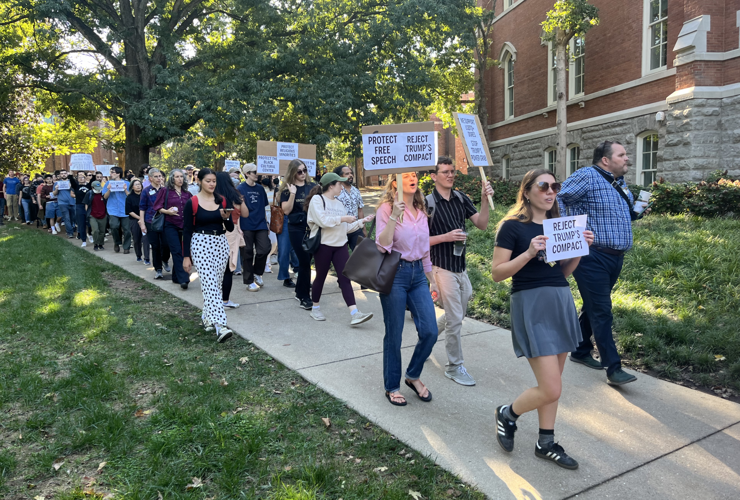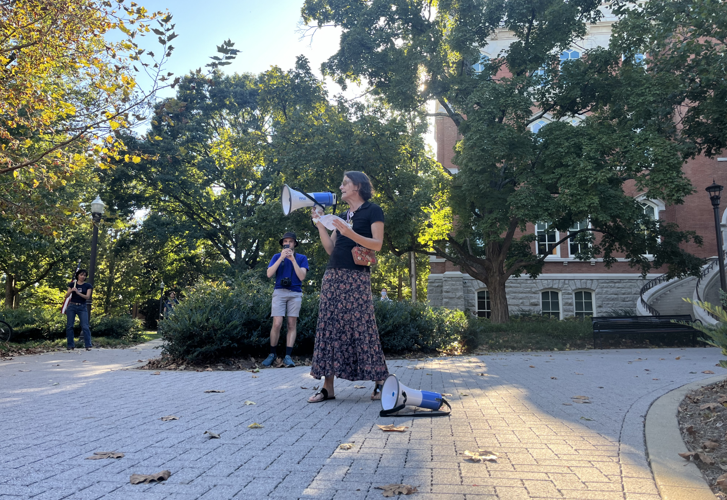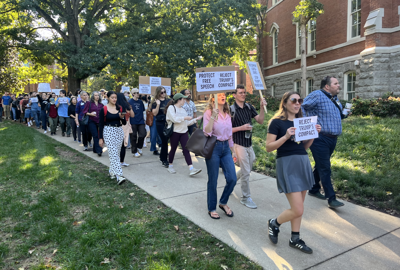Frustrated faculty and students cut a loud path through Vanderbilt’s main campus on Wednesday afternoon en route to Kirkland Hall, the university’s administrative heart and home to Chancellor Daniel Diermeier’s office. Holding handmade signs reading “Reject Trump's Compact” and “Protect Free Speech,” campus protesters chanted and beat drums, capturing the attention of fellow classmates between classes and campus activities.
Vanderbilt among nine higher-education institutions asked to sign Trump administration compact in exchange for financial opportunities
Vanderbilt is among nine universities nationwide considering an agreement with the Trump administration to receive priority federal funding in exchange for making several concessions related to campus life, admissions and academic freedom. The 10-point memo — called the “Compact for Academic Excellence in Higher Education” — would ban the use of race or sex in hiring and admissions processes, freeze tuition for five years, cap international undergraduate enrollment, and require applicants to take the SAT or ACT. It would also hold the schools to the government’s trans-exclusionary definition of gender. Protesters Wednesday called on Vanderbilt to reject the bargain and see the moment as critical to determining the future of American universities.
“This is another attack in a long string of attacks on higher education that have been ramping up over the last few months, but it is also the first time the president has formally asked universities to sign a contract with him,” says Jade Miller, a fifth-year graduate student studying biomedical engineering. “ We're working with a lot of undergrad organizers, and we're also working with organizers at other of the nine schools as well — we are all standing at a very important spot. If our nine universities cave in, who's to say what happens with the rest of the country?"
Miller is part of the corps of student-organizers with Vanderbilt Graduate Workers United who helped put together the show of public campus opposition. After the group marched to Kirkland Hall, several speakers shared more pointed arguments against the Trump agreement and took aim at Diermeier. A small group that included students and professors then hand-delivered a petition with more than a thousand signatories asking Diermeier to reject the agreement.
“We are here today to show our power and insist that our leaders stand for something,” Lynne Berry, a faculty member in the department of biostatistics, told the crowd. “ We ask nothing more — and certainly nothing less — than for our senior leaders to adhere to their own stated principles and values to the long-held, oft-repeated principles and values of this institution. Our institution.”

Lynne Berry speaks to protesters, Oct. 8, 2025
Berry later told the Scene that she does not fear repercussions from the university — “They don’t have anything I need,” she says. Rather, she fears the silence and apathy of longtime university colleagues. Carwil Bjork-James, an assistant professor of anthropology, expects more direct faculty opposition to take place at an upcoming faculty senate meeting.
Under Diermeier, the university simultaneously crafted and adopted what the chancellor calls "institutional neutrality." The vague ideological stance generally encourages administrations to remain apolitical on issues like foreign relations, gender rights and racism.
"Vanderbilt is carefully reviewing the Compact for Excellence in Higher Education and providing meaningful feedback to the Administration,” reads a statement provided by Diermeier’s office. “Our review is grounded in our independent judgment, pursuit of excellence, and long-standing commitment to academic freedom and open inquiry. We appreciate that our community is engaging thoughtfully on issues that impact higher education, and we continue to encourage open dialogue and civil discourse across our campus."








